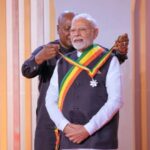
On Sunday, Romanians will go to the polls for a parliamentary election that has attracted heightened attention due to political instability and uncertainty over the result of a recent presidential election. The Far Right is expected to make significant gains, taking advantage of the confusion and dissatisfaction among voters, with the potential for the shock outcome of the presidential election to impact the results.
The Political Context of Romania’s Election – Romania, a country in Southeast Europe with a population of about 19 million people, has experienced political turbulence in recent years. Following decades of communist rule, Romania underwent a transition to democracy in the late 1980s and early 1990s. However, the country has faced challenges such as corruption, economic disparities, and political fragmentation. The uncertainty surrounding the presidential election result has only added to this instability, creating a volatile environment ahead of the parliamentary elections.
The outcome of the presidential election has been controversial, with questions raised about its legitimacy and the integrity of the electoral process. The Far Right, which has traditionally struggled to gain significant political traction in Romania, has found an opening in the wake of this uncertainty. They are positioning themselves as an alternative to the status quo, capitalizing on growing public dissatisfaction with the traditional political elite and the perception of corruption within the ruling parties.
The Presidential Election Shock and Its Impact – The shock result in the presidential election, which is still being contested in the courts, has created a rift among the political establishment. The disputed outcome has led to protests and a general sense of disillusionment among Romanians, many of whom feel their voices were not heard in the electoral process. These events have created a perfect storm for the Far Right, which is positioning itself as a defender of national sovereignty and a critic of the political establishment.
While the presidential election is separate from the parliamentary vote, the fallout from the contested result has affected voter sentiment, particularly in rural areas and among working-class Romanians. The Far Right has been quick to capitalize on this mood, tapping into nationalistic sentiments and concerns over issues such as immigration, EU influence, and economic inequality. They are gaining ground among those who feel left behind by the traditional political parties and who are skeptical of Romania’s relationship with the European Union.
The Far Right’s Strategy – The Far Right in Romania has been gaining momentum in recent years, largely due to frustration with the political establishment. Their campaign focuses on issues such as immigration, the protection of traditional Romanian values, and skepticism toward the European Union. The party platforms are often characterized by nationalistic rhetoric, anti-elitism, and calls for stricter immigration controls.
Their rise is also fueled by concerns over Romania’s economic challenges, including high unemployment rates in certain regions, rising inflation, and an overall sense of stagnation in the country’s economic development. The Far Right has successfully framed itself as a voice for the economically disadvantaged, promising to restore Romania’s national pride and sovereignty.
In addition to their anti-establishment messaging, the Far Right has also made use of social media and digital platforms to amplify their message. They have capitalized on online echo chambers to spread their populist agenda and rally support among younger voters, who are increasingly disillusioned with the traditional political parties.
The Political Landscape and Traditional Parties’ Struggles – Romania’s traditional political parties are also facing significant challenges. The Social Democratic Party (PSD), which has historically been one of the dominant political forces in the country, has been embroiled in corruption scandals and is struggling to regain the public’s trust. Meanwhile, the National Liberal Party (PNL) has failed to deliver on key economic promises and has been criticized for its handling of the COVID-19 pandemic.
The ongoing political fragmentation, coupled with a lack of strong leadership, has created an opening for the Far Right to capitalize on discontent. Voter apathy is also a significant concern, with many Romanians feeling disconnected from the political process. Low voter turnout in previous elections has exacerbated this issue, allowing fringe parties to gain a disproportionate amount of influence.
The EU’s Role and Romania’s Relationship with Brussels – Romania’s relationship with the European Union (EU) has been a central issue in the parliamentary election. The Far Right has consistently criticized the EU, accusing it of undermining national sovereignty and imposing policies that do not align with Romania’s interests. They argue that the EU’s focus on issues such as climate change and migration has distracted from the economic needs of Romanian citizens.
While the traditional parties have largely supported Romania’s membership in the EU and its integration into European institutions, the Far Right has gained traction among those who feel that Romania’s EU membership has not delivered the promised benefits. Critics argue that while Romania has received significant funding and support from the EU, the benefits have not been equally distributed, leading to dissatisfaction, particularly in rural areas.
The EU has also been critical of Romania’s track record on corruption, governance, and rule of law. While the country has made progress in these areas, concerns persist over the independence of the judiciary and the effectiveness of anti-corruption measures. The Far Right has used these criticisms to position themselves as an alternative to the traditional political parties, promising to stand up to foreign influence and protect Romania’s interests on the global stage.
Voter Sentiment and Potential Outcomes – As Romanians head to the polls, voter sentiment is mixed. On the one hand, many are hopeful that the parliamentary election will bring about much-needed political change and stability. On the other hand, there is widespread frustration with the traditional political parties, which are seen as corrupt and out of touch with the needs of ordinary citizens.
Polls indicate that the Far Right is likely to make significant gains in the election, potentially securing a substantial portion of the vote. While it is unlikely that they will secure an outright majority, their rise is a reflection of the growing dissatisfaction with the political establishment. If they are able to form a coalition with other parties, the Far Right could exert significant influence over the direction of Romania’s future.
The election outcome will also have implications for Romania’s relationship with the EU and the broader international community. A strong showing by the Far Right could lead to tensions with Brussels, as the EU is unlikely to support a government that is openly hostile to its policies and values. Additionally, a rise in nationalism and anti-EU sentiment could have broader implications for the stability of the region, especially given the ongoing conflicts in Ukraine and other parts of Eastern Europe.
Conclusion – Romania’s parliamentary election on Sunday is poised to be a crucial moment in the country’s political history. The Far Right expected gains reflect the growing dissatisfaction with the political establishment, particularly in the wake of the disputed presidential election result. The rise of nationalism, anti-EU sentiment, and economic frustration has created an opening for the Far Right to gain a foothold in Romanian politics.
While it remains to be seen whether the Far Right will be able to form a coalition government or significantly influence policy, their rise is a sign of broader trends in European politics, where populist and nationalist movements are gaining ground across the continent. The outcome of the parliamentary election will have important consequences for Romania’s future, its relationship with the EU, and the broader geopolitical landscape in Eastern Europe.




































Leave a Reply